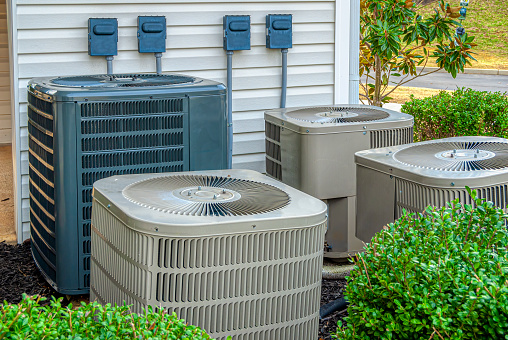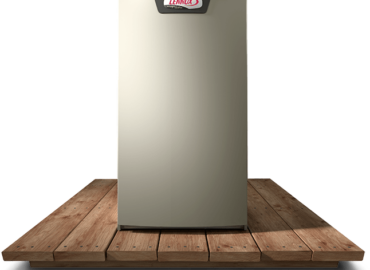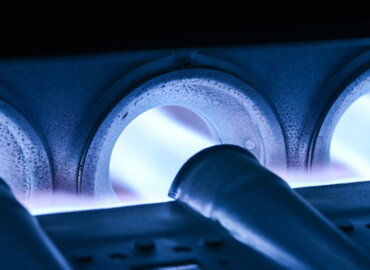8 Reasons Why Your Air Conditioner Is Leaking Water
When your air conditioner starts leaking water, it can be a source of frustration and concern. This common issue, ranging from clogged condensate drain lines to frozen evaporator coils, is one that confronts many homeowners, especially during the challenging hot and humid days. Understanding the various causes behind AC water leakage—like dirty air filters or improper AC installation—is crucial for maintaining an optimally functioning unit and ensuring your comfort.
The objective of this article is to guide you through a systematic approach to addressing a leaking air conditioner. You’ll gain insights into pinpointing the source of the drip, be it your AC dripping water indoors or experiencing ac water leakage, and learn the necessary steps for a resolution, such as cleaning or replacing air filters, unclogging drain lines, and when to engage professional help. Equipped with this knowledge, you’ll be better prepared to tackle the problem of water dripping from your air conditioner head-on and prevent potential damage to your home.
Identifying the Source of the Air Conditioner Water Leak
To identify the source of an air conditioner leaking water, you should:
- Inspect the Drain Pan: Check for water pooling around the indoor unit. A full or problematic drain pan may signal an issue, especially if your air conditioner fails to turn on due to an overflow float switch activation. This could be due to cracks or damage in the pan itself.
- Evaluate the Condensate Drain Line: Ensure there are no blockages. If the PVC pipe from the condensate collection pan outlet is glued in place, consider creating a new detachable connection using a PVC coupling to facilitate cleaning and prevent future clogs.
- Check the Air Filter: A dirty air filter can cause evaporator coils to freeze, leading to water leakage. Ensure the filter is clean to maintain proper airflow and prevent ice formation on the coils.
- Look for Ice: If there is ice on the evaporator coils, turn off the unit and clean the condensate drain pipe. You can defrost the coil by turning on just the fan, which will also help you to identify if the frozen coil was the source of the leak.
- Verify Installation: Incorrect installation can lead to water dripping from your air conditioner. Ensure the unit is level and that for window AC units, the outside is angled slightly downward for proper drainage.
- Maintenance Checks: Regularly replace air filters and schedule professional maintenance. During service, the technician should check the drain pan, flush the drain line, and verify the condensate pump’s functionality to prevent future leaks.
If you find yourself unable to identify or fix the leak, or if you observe signs of low refrigerant like increased energy bills or a hissing sound, it’s time to contact a professional HVAC technician for assistance. Addressing these issues promptly can help prevent further water damage and ensure the longevity of your air conditioning unit.
Cleaning or Replacing the Air Filter
To prevent your air conditioner from leaking water due to frozen evaporator coils, it’s essential to regularly maintain the air filter. Here’s how you can clean or replace the air filter effectively:
Cleaning or Replacing the Air Filter
- Turn Off the AC Unit: Before you begin, ensure your safety by turning off the air conditioner. This will allow you to handle the filter without the unit operating.
- Locate the Air Filter: The air filter is typically situated behind the return vent or along the return duct. Once located, carefully remove the filter from its housing.
- Inspect the Filter: Check the filter for any visible signs of dust, dirt, or discoloration. This will help you determine whether the filter needs cleaning or replacing.
- Cleaning Reusable Filters:
- If the filter is reusable, gently vacuum to remove loose dirt.
- For a deeper clean, soak the filter in a mixture of vinegar and water, then rinse with clean water.
- Replacing Disposable Filters:
- If the filter is disposable, measure the size and purchase a new one that matches the dimensions.
- Install the new filter, making sure the arrows on the frame point in the correct direction—away from you and toward the airflow of the unit.
- Reinstall the Filter: Once cleaned or replaced, slide the filter back into its slot, ensuring a snug fit without any gaps.
Regular maintenance of your air filter can lead to an array of benefits, such as extending the life of your AC unit, improving energy efficiency, enhancing indoor air quality, and keeping the ductwork clean. For optimal performance, clean or replace your air filter based on the manufacturer’s recommendations, usually once a month, and schedule annual maintenance to inspect and clean the condensate drain. By doing so, you can minimize the risk of air conditioner dripping water and ensure your unit operates efficiently. Always refer to your air conditioner’s manual for specific instructions on filter maintenance to guarantee you’re following the correct procedures.
Unclogging the Condensate Drain Line
To tackle the issue of your air conditioner leaking water due to a clogged condensate drain line, follow these actionable steps:
- Turn Off the AC: Safety first—ensure the AC unit is off before attempting any maintenance.
- Locate Drain Lines: Find both the indoor and outdoor parts of the drain line. The outdoor part is typically located near the condenser unit.
- Inspect for Blockages: At the indoor access point, check for any visible clogs that could be causing water to back up.
- Clearing the Clog:
- If accessible, use a wet/dry vacuum on the outside pipe opening to draw out the clog.
- For stubborn blockages, a plumber’s snake or a garden hose can help clear the way.
- Disinfect the Line: To prevent mold growth, flush the line with a solution like diluted vinegar or bleach, and let it sit for at least 30 minutes.
- Rinse Thoroughly: After the solution has done its work, flush the line with water to ensure it’s clear and draining properly.
- Preventative Measures: Regularly flush the line with vinegar or a biocide tablet to prevent algae and mold buildup.
- Professional Inspection: For peace of mind, have an HVAC technician inspect the system annually, which may include using a special vacuum to clear the drain line and possibly installing a float switch to prevent overflow.
Remember, a clogged drain line can lead to serious issues like water damage and mold. By following these steps and incorporating regular maintenance, you can prevent ac water leakage and keep your air conditioner dripping water at bay. If the problem persists or you’re not comfortable performing these tasks, don’t hesitate to seek professional assistance.
Inspecting and Repairing the Drain Pan
To ensure your air conditioner stops leaking water, a thorough inspection and potential repair of the drain pan are essential. Here’s how to proceed:
- Check the Drain Pan: After running your AC for 20-30 minutes, use a flashlight to examine the fixed drain pan and the overflow pan. Look for any signs of damage such as cracks or holes that could cause water to escape, as well as any obstructions that might impede water flow.
- Test for Drainage: Gently pour some water into the overflow pan to test if it’s draining correctly. If the water isn’t draining, there might be a blockage in the drain line or an issue with the pan itself.
- Repair or Replace: If you find any damage to the pan:
- For minor cracks or holes, clean the area and apply epoxy putty as a temporary fix.
- For significant damage, it’s best to replace the drain pan. Measure your current pan to ensure you purchase the correct size and follow the manufacturer’s instructions for installation. If you’re not comfortable doing this yourself, contact a professional.
Regular maintenance is key to preventing ac water leakage. By scheduling professional check-ups, you can have your drain pan and condensate drain line cleaned and inspected to avoid any future issues with your air conditioner dripping water. Remember, addressing these components promptly can save you from water damage and maintain the efficiency of your AC unit.
Checking and Maintaining the Condensate Pump
Maintaining your air conditioner’s condensate pump is crucial for preventing ac water leakage and ensuring your system doesn’t contribute to air conditioner leaking water. Here are the steps to check and maintain the condensate pump:
- Power Off: Always start by shutting off power to the unit at the breaker panel to ensure your safety during maintenance.
- Pump Disconnection:
- Unplug the pump and carefully disconnect it from the PVC pipe.
- Have a bucket ready to collect any residual water that may drain out.
- Clean the Pump:
- Open the top of the pump and empty all water inside.
- Rinse the interior with warm, clean water.
- Use a bottlebrush or a similar tool to scrub away any dirt or debris in the reservoir and drain openings.
- For small, hard-to-reach areas, compressed air can be effective in removing additional debris.
- Check Valve:
- Remove and clean the check valve by blowing air through it or flushing with warm soapy water.
- Reattach the discharge tubing, ensuring it’s secure, possibly with a hose clamp.
- Vinegar Flush:
- Periodically, pour a mixture of vinegar and water into the pump while it runs to clean and maintain it.
- This can be done every few months to keep the pump in optimal condition.
- Deep Cleaning (as needed):
- For a more thorough cleaning, deep clean the pump by removing it completely, unscrewing the tank, and cleaning the motor and lines with a bleach-water mix.
- Reassembly and Testing:
- Once everything is clean, reassemble the pump and reconnect it to the system.
- Restore power and test the pump to ensure it’s working correctly.
Remember, if you’re not comfortable with these steps or encounter issues, it’s wise to have an HVAC technician handle the maintenance during a regular check-up. Regular care, such as cleaning the pump with distilled vinegar a couple of times a year or using condensate drain tablets, will prolong the life of your HVAC unit and prevent issues related to air conditioner dripping water.
Professional Maintenance and When to Call Experts
When addressing an air conditioner leaking water, it’s crucial to consider professional maintenance to ensure your system operates efficiently and to prevent potential issues from escalating. Here are key factors to keep in mind:
- Use of Secondary Drains: Incorporating secondary drains can safeguard your system against overflow, which is a common cause of AC water leakage. It’s a preventative measure that can save you from costly damages in the long run.
- Condensate Fittings: While it’s necessary for condensate fittings to be secure, they don’t always have to be glued. This allows for easier maintenance and troubleshooting if a leak does occur.
- Signs for Professional Maintenance: There are several indicators that suggest it’s time to seek professional help:
- Unusual odors emanating from the unit
- Poor airflow or weak air delivery
- Moisture or pooling water around the system
- Strange noises during operation
If you notice any of these signs, it’s advisable to schedule professional maintenance promptly.
- Regular AC Maintenance: A consistent maintenance schedule is vital for the health of your AC unit. Technicians will check filters, coils, and fins, which are essential for the air conditioner to function effectively. Neglecting these can lead to decreased performance and increased energy use.
- Immediate Steps for Leaks: If you discover a leak, immediately turn off the air conditioner to prevent further water damage. Then, contact a qualified technician to inspect and repair the unit. It’s also important to clean the area around the leak to prevent mold and mildew growth.
- Thermostat Malfunctions: Sometimes, a malfunctioning thermostat can cause the evaporator coils to get too cold, leading to condensation and leaks. If adjusting the thermostat settings doesn’t resolve the issue, you may need a professional to diagnose and fix any faulty wiring.
By understanding these aspects and taking the right actions, such as seeking professional assistance when necessary, you can effectively manage and prevent instances of your AC dripping water, ensuring the longevity and efficiency of your air conditioning system.
Conclusion
Navigating the complexities of a leaking air conditioner is an exercise in due diligence and preventive care. From cleaning filters to maintaining the condensate drain line, we’ve highlighted the essential steps to safeguard your home against water damage while ensuring your unit runs efficiently. It’s clear that routine maintenance and vigilance are your best allies in curbing the common, yet disruptive, problem of AC water leakage.
While a proactive approach can mitigate most issues, some scenarios warrant the discerning expertise of professionals. For those instances when troubleshooting and maintenance surpass the realm of DIY, don’t hesitate to reach out to a qualified HVAC technician. Their specialized skills will not only provide peace of mind but also assure the health of your air conditioning system. Remember, when it comes to the comfort and safety of your living space, taking timely action is paramount, so seek professional assistance to address any persistent issues with your AC.
FAQ
How can I tell if my air conditioner is leaking water?
If you notice water pooling around your air conditioner or dripping from the unit, you may have a water leak. You may also notice a musty or moldy odor, which can indicate that water is accumulating and not draining properly.
Can a dirty air filter cause an air conditioner to leak water?
Yes, a dirty air filter can cause an air conditioner to leak water. When the air filter is dirty, it can restrict airflow over the evaporator coils, causing them to freeze over. When the ice melts, it can overflow the drain pan and leak out of the unit.
Can I fix an air conditioner water leak myself?
Depending on the cause of the water leak, you may be able to fix it yourself. However, it's usually best to contact a professional HVAC technician to diagnose and repair the issue, as they have the knowledge and tools to safely and effectively fix the problem.




